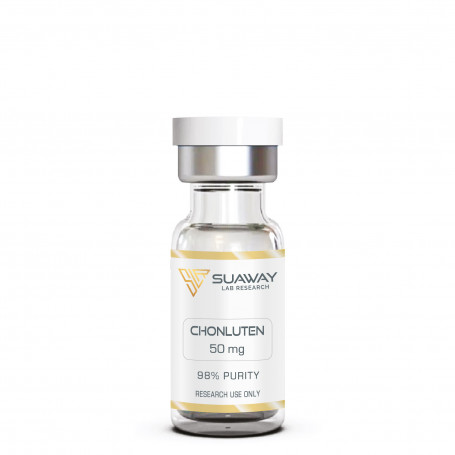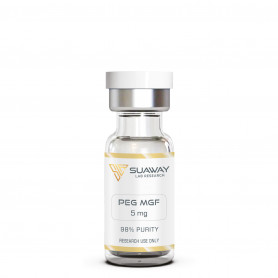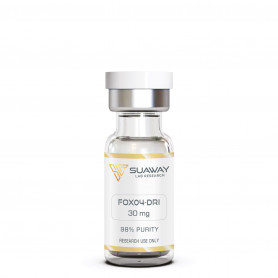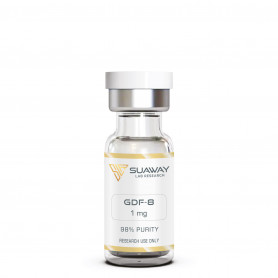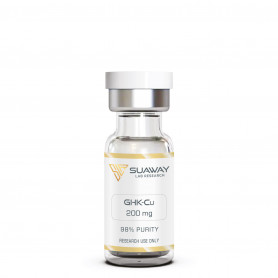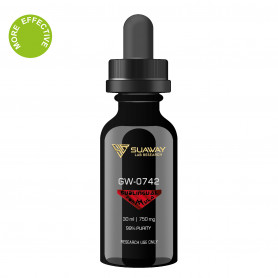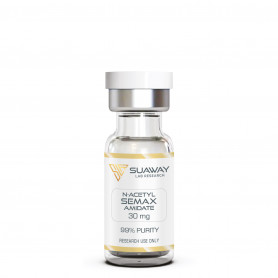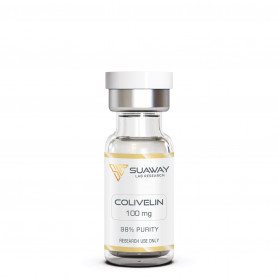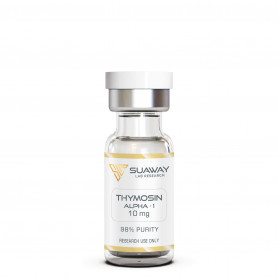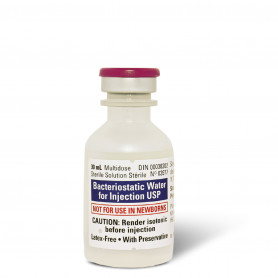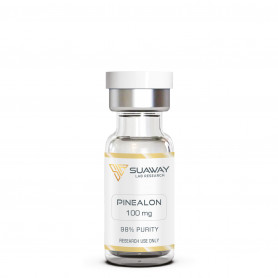CHONLUTEN - 50mg
Chonluten is a peptide that regulates gene expression and is short in length. According to research, it is primarily active in the tissue of the lungs, with only secondary levels of activity being found in the GI tract. Chonluten's ability to regulate pulmonary mucosal function could be particularly useful in the treatment of chronic inflammatory lung illnesses including asthma, COPD, and in acute and chronic respiratory disorders of infectious and non-infectious origin, as well as for preserving the function of the respiratory system in older patients.
Chonluten has been shown to have effects on:
- After pneumonia
- Chronic cardiopulmonary insufficiency
- Chronic respiratory failure
- After prolonged artificial ventilation
- Pulmonary tuberculosis in remission
- In case of respiratory distress syndrome
- Intense sports
- To maintain the function of the respiratory system in elderly
- Asthma
- Crohn’s disease and Ulcerative Colitis.
Description
STRUCTURE
Sequence: Glu-Asp-Gly
Molecular Formula: C11H17N3O8
Molecular Weight: 319.27 g/mol
PubChem CID: 194641
CAS Number: 75007-24-8
Peptide purity: greater than 98%
Other details: No TFA Salt, No Mannitol
Storage: Lyophilized peptide must be stored at -20 ° C and peptide solution at + 4 ° C
Chonluten has low oral and excellent subcutaneous bioavailability.
DESCRITPION
Chonluten is a peptide that regulates gene expression and is short in length. It would seem that lung tissue is where it is most active, with the gastrointestinal system showing secondary levels of activity. It controls genes involved in inflammation and antioxidant activity, as well as genes involved in proliferation responses to inflammation. Chonluten's potential to regulate the function of the pulmonary mucosa might have significant implications for the treatment of chronic inflammatory lung illnesses like asthma.
According to the findings of several studies, Chonluten is responsible for regulating the expression of genes that code for anti-inflammatory and antioxidant pathways, notably in the lungs and the digestive system. Chonluten is frequently used as a geroprotective agent (slowing or preventing the ageing process) as well as an anti-inflammatory in the lungs, where it appears to normalise mucosal function in the setting of conditions such as COPD.
According to the findings of recent research, short peptides have the ability to control all elements of gene expression, including epigenetic DNA methylation. Modeling studies have demonstrated that a single short peptide may influence hundreds of genes by penetrating both cytoplasmic (cell) and nuclear membranes to bind directly to DNA.
It would seem that Chonluten has a tissue-specific action in the lungs, since it modifies DNA expression in a manner that normalises the mucosa in the bronchi. It is possible for it to be changed in ways that lead to changes in mucus production, extracellular matrix structure, and other aspects of the body as a result of a variety of inflammatory disorders, such as asthma or COPD.
It would seem that the actions of Chonluten are mediated through a number of genes, including c-Fos, the gene for the heath shock protein HSP70, SOD, COX-2, and TNF-alpha, as well as genes from the antioxidant system. The regulation of the majority of these genes has clear consequences that are anti-inflammatory. c-FOS, on the other hand, is drawing a lot of attention. Protein c-FOS functions as a powerful general regulator of cellular processes including proliferation, differentiation, and survival. In the presence of cellular damage and low oxygen levels, it becomes active.
During the ongoing worldwide covid-19 epidemic, scientists have a clear interest in discovering a peptide that has active anti-inflammatory actions. According to the findings of recent studies, Chonluten (in addition to the Bronchogen peptide) is a successful therapy for bronchopulmonary disease. Chonluten has stress-protective properties and seems to increase the efficacy of conventional treatment in patients with chronic bronchitis that also has an asthmatic component. Because of both of these characteristics, as well as the fact that Chonluten improves both physical performance and the state of the organism's function when it is exposed to low oxygen levels, it is possible that this tripeptide could serve as an effective adjuvant in a multi-component cocktail designed to combat covid-19.
It has been shown that exposure to chonluten in the lungs may have effects that are comparable to those in the digestive system. According to research, it may be helpful in lowering inflammation and vascular changes in the gastrointestinal system that come from inflammatory disorders such as Crohn's disease and ulcerative colitis. These conditions cause vascular abnormalities in the digestive tract.
REFERENCES
V. Khavinson et al., "Peptide Regulation of Gene Expression: A Systematic Review" [PubMed]
V. Khavinson et al., "Peptidergic regulation of expression of genes encoding antioxidant and anti-inflammatory proteins" [Bulletin of experimental biology and medicine]
V. Khavinson et al., "Short Peptides Regulate Gene Expression" [PubMed]
L.I. Fedoreyeva et al., "Penetration of short fluorescence-labeled peptides into the nucleus in HeLa cells and in vitro specific interaction of the peptides with deoxyribooligonucleotides and DNA" [PubMed]
V.N. Anisimov, V. Khavinson "Peptide bioregulation of aging: results and prospects" [PubMed]
DISCLAIMER
This product is intendend for lab research and development use only. These studies are performed outside of the body. This product is not medicines or drugs and has not been approved by the FDA or EMA to prevent, treat or cure any medical condition, ailment or disease. Bodily introduction of any kind into humans or animals is strictly forbidden by law. This product should only be handled by licensed, qualified professionals.
All product information provided on this website is for informational and educational purposes only.

